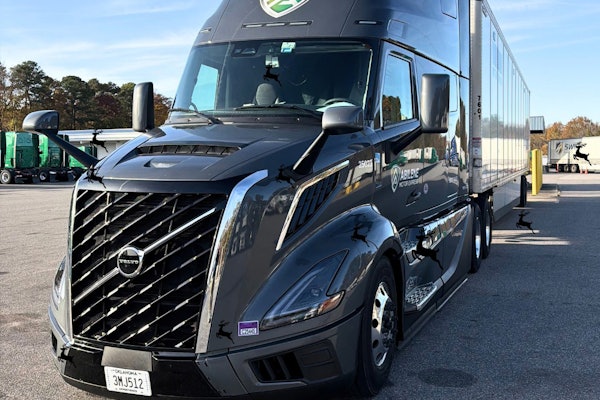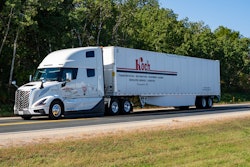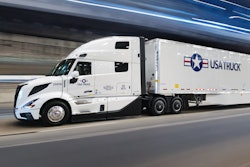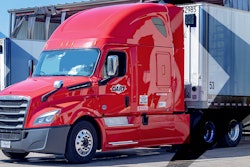American Trucking Associations and Washington Trucking Associations filed a brief in support of a trucking company’s request that the U.S. Supreme Court hear its appeal of a ruling that overtime for interstate drivers must be based on both time worked inside and outside the state. The Washington Supreme Court had rejected arguments that this approach would violate the Commerce Clause.
Two Florida men pled guilty Sept. 13 in U.S. District Court in Miami to producing fraudulent driver’s licenses, according to DOT-OIG. Sentencing for both Levern Cooper and Pierre Angrand is scheduled for Jan. 17. DOT-OIG said its investigation, which was conducted jointly with the FBI and the Hollywood (Fla.) Police Department, revealed that Cooper
and Angrand counterfeited State of Florida driver’s licenses, commercial driver’s licenses – some with hazardous material endorsements – and identification cards.
Jose P. Silva, 41, owner of Philadelphia-based Real Transportation Inc., pled guilty to federal racketeering and identification fraud charges in connection with providing Brazilian nationals living here illegally with documents needed to get driver’s licenses, according to the U.S. Attorney’s Office. Ten truck drivers pled guilty to federal identification fraud charges following their arrests in June. Silva, who also was arrested in June, is accused of assisting many of the drivers to obtain the false CDLs and then hiring them as truck drivers to haul construction debris from the Philadelphia area to various commercial landfills.
Q How do the states assess the owner-operator classification issue for worker’s compensation issues?
A There is no consistency among the states in the treatment of owner-operators for worker’s compensation purposes. The situation is so inconsistent and confusing that I must offer the following caveat at the outset: Any carrier with owner-operators should consult competent counsel in states in which it domiciles them. And carriers should discuss these issues with their insurance broker and agent.
States approach the worker’s compensation issue for owner-operators in different ways. At last count, about a third of the states were “statutory states” that had express statutes or regulations that define the circumstances in which an owner-operator would be considered an independent contractor and not an employee for worker’s compensation purposes. While these statutory states provide a greater certainty regarding classification issues, their different statutory language is neither uniform nor consistent. Some states require specific language in the owner-operator agreement to ensure compliance. Others require an expressed waiver application, prescribe a certain method of compensation as a precondition of independent contractor status, etc. Most statutory states allow the owner-operator to either own or lease-to-own the truck and still qualify as an independent contractor, but in at least one state, the owner-operator may not lease the equipment from the motor carrier and still qualify.
Most states determine the worker’s compensation classification issue based upon case law and administrative rulings. The case law precedent in many states traces back to the so-called “20 factor” control test established years ago by Internal Revenue Service rulings. This control test is not industry-specific, and it is difficult to find factors in which an owner-operator truly has independence from control by the company to whom he is leased.
Many states over the years have pruned the 20-part test down to three to five indicating factors. If it’s possible to generalize, a carrier seeking to preserve independent contractor status for state law purposes should exercise great caution in contractual language, in operations, in employee manuals, etc. Ensure that the owner-operator is treated differently from employee drivers and is given the freedom to select the means and method of providing service, subject only to the legal restrictions imposed by Federal Motor Carrier Safety Administration safety regulations. A classification issue can hang up on an issue of semantics. The owner-operator should be allowed the ability to succeed or to fail, the option to purchase fuel and supplies where he pleases, and the freedom to repair and maintain his equipment from vendors of his own choosing.
As suggested by the FedEx case mentioned in last month’s article (“Are independents independent?” CCJ Oct. ’07), the trends in the owner-operator classification issue are not favorable to carriers. At the state law level, efforts to address bad case law and precedent through legislative action are being undertaken by state trucking associations, but with limited success. In one state, for example, the state trucking association initiated legislation to correct the problem, and when the trial lawyers and the legislature finished, the bill that was passed had the opposite effect.
Of some use in classification disputes are various states’ small employer exemptions. A little more than a dozen states do not require worker’s compensation where the employer typically has no more than three to five employees. Under the exemption, fleet operators with only a couple of drivers have a basis for not paying worker’s compensation. But the possibility of cut-through liability and accidents that occur in states with no small employer exemption precludes this from being a true safe harbor against worker’s compensation claims.
In addition to the worker’s compensation issue, state law treatment of the classification issue affects whether state unemployment tax laws are applicable to owner-operators. Although more easily confined to the situs of dispatch or state of the owner-operator’s domicile, this issue also bears careful review and risk assessment.
In sum, conflicting state law decisions on the classification issue are not helpful in preserving the economic advantage of owner-operators or encouraging small businesses. However, as long as the IRS allows 1099 treatment of owner-operators, owner-operators as a class of service provider will be a significant part of our industry.
Last month, we began our three-part look at the owner-operator classification issue. In the third installment, I will address the risk assessment issue, insurance and legislative options available in light of the unsettling state case law discussed above.
TWIC begins for port drivers
Enrollment for the transportation worker identification credential (TWIC) began Oct. 16 at the Port of Wilmington, Del., for workers, including truck drivers, who have unescorted access to secure areas at U.S. ports. Ultimately, an estimated 110,000 drivers will need the biometric identification credential at ports. The Transportation Security Administration announced plans for a rapid rollout of the cards at other ports beginning in early November, with the Port of Tacoma, Wash., and the Port of Oakland, Calif., among the early sites.








